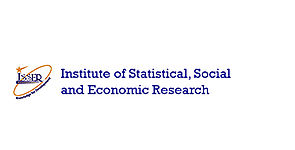ISSER Forecasts 4.5% GDP Growth Rate for Ghana in 2024
Ghana’s economic growth is projected to reach 4.5% by year-end, according to new estimates from the Institute of Statistical, Social, and Economic Research (ISSER).
This outlook exceeds the International Monetary Fund’s recent revision, which adjusted Ghana’s growth forecast from 3.1% to 4% for 2024.
The IMF’s upward adjustment of the GDP growth for Ghana at end-2024 is attributed to the reforms Ghana is implementing under the IMF programme, which are significantly aiding its economic recovery.
ISSER’s optimism of surpassing the 4% end-2024 GDP growth rate forecast by the IMF is corroborated by the Finance Minister, Dr Mohammed Amin Adam, who has also voiced confidence in Ghana’s positive economic trajectory.
According to the Finance Minister, investments made by the Government in key sectors such as agriculture, rural infrastructure, tourism, and ICT are expected to bolster the nation’s growth momentum.
“We are not surprised by the Fund’s revision to 4%, given our investments in agriculture, rural infrastructure, tourism, and ICT, many of which are set to mature by year-end,” he stated, also emphasizing the significant investments made in SMEs as well.
At the release of the State of the Ghanaian Economy Report and a review of the economy’s third-quarter performance, Director of ISSER, Professor Peter Quartey, pointed to a “positive growth trajectory,” contingent on fiscal prudence and strategic investments.
“The IMF projects a 4% growth rate, but with continued reform, we are optimistic about achieving a 4.5% GDP growth rate at end-2024,” said Prof. Quartey.
His remarks underscore the need for expenditure rationalization, particularly through digitalizing payroll systems to streamline procurement and compensation outlays.
Prof. Quartey further stressed that Ghana’s economic resilience will hinge on revitalizing agriculture and industry, sectors he described as “highly labour-intensive and essential for job creation.” He recommended that government capital allocation prioritize these areas to stimulate employment and reduce dependency on imports.
To strengthen Ghana’s fiscal position, Prof. Quartey argued for a legislative cap on government debt to prevent excessive spending, proposing amendments to the fiscal responsibility law to incorporate a debt ceiling.
ISSER’s projections reflect optimism for Ghana’s economy but highlight that sustainable growth will depend on both enhanced revenue mobilization via digitalization and proactive measures to control inflation and debt.








